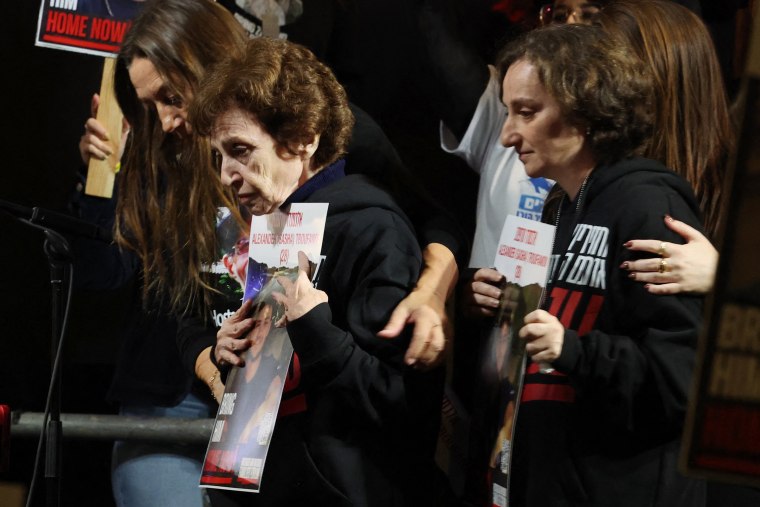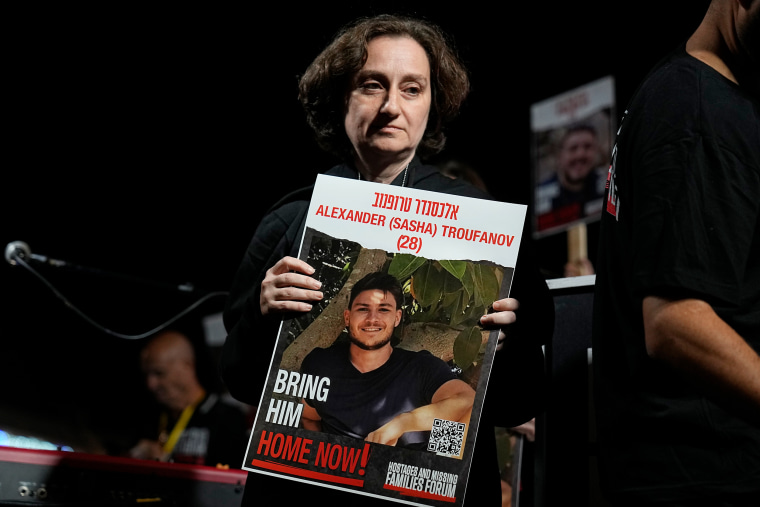NIR OZ, Israel — Irena Tati and her daughter Yelena Trupanov spent more than seven weeks in Hamas captivity in Gaza, and just over a week after they were freed they returned to survey the wreckage of the burned-out kibbutz that had been their home.
Ordinarily, the residents of Kibbutz Nir Oz would be lighting candles Thursday for the first night of Hanukkah.
But there are few residents around, the communal dining hall is riddled with bullet holes, and the kitchen is burned out.
The only thing Tati, 73, is thinking about is the return of her grandson Sasha, still held by Hamas in Gaza. While she is holding out hope, there are no immediate signs that the hostage negotiations that cleared the way for her release will resume.
“Now, Hanukkah is a holiday of light and joy, and I am waiting for war to end on such a holiday,” Tati told NBC News. “And people close to us in Gaza must return home.”
Tati looked around wearily as she stepped lightly over patches of debris and rubble as she walked past the destroyed houses of her Nir Oz neighbors.
While her own home remained remarkably intact, the houses to either side of hers had been reduced to uninhabitable ruins. Her house has no electricity, and it is dusty from two months of neglect, but it’s still standing.
And, more important to Tati, her cat, Gome, was there, too, crawling over from inside the house to curl around her feet.
“I’m afraid she’s dead, but she’s here,” Tati said before she laid out trays of food and water in the grass.
Trupanov and Tati, both dual citizens of Israel and Russia, spent 53 days in Gaza before they were freed on Nov. 29, along with 10 other Israeli hostages and four Thai nationals.
Neither Trupanov nor Tati would speak about their time in captivity.

Trupanov’s husband, Vitaly, was killed in the Oct. 7 attack on the kibbutz, and her 28-year-old son, Sasha, and his girlfriend, Sapir Cohen, were also taken hostage. Cohen was later released, but Sasha remains in captivity in Gaza.
Their pain is shared by many in this small community.
Nir Oz, less than 2 miles from the fenced-off border with Gaza, was one of the areas hit hardest when Hamas militants stormed through southern Israel two months ago.
About a quarter of the 400 residents who lived here were killed or kidnapped, and more than 30 are still believed to be in Gaza.
A small post office at the center of the kibbutz has become a makeshift memorial and record of the lives upended. Individual mailboxes for each resident are tagged with a red mark for those who were killed, black for those who were kidnapped and blue for those who have returned. It's a powerful visual that shows black marks far outnumbering the blue.
Among the other Nir Oz hostages who have been freed is Yocheved Lifshitz, 75, who was held in Gaza for just over two weeks. Her husband, Oded, 83, a human rights and peace activist, is still listed among the captives.
A lush, green cactus garden stands outside the Lifshitz residence, while the inside of the house is charred, with nothing resembling a home or a life recognizable in the ashes.
Rita Lifshitz, 59, the couple’s daughter-in-law, came to live full-time in Nir Oz in 1988 and calls it her “paradise.”
Standing outside the ruins of her in-laws’ home, she said, “Our whole kibbutz were peace fighters, and we are the ones that they destroyed.”
From the Lifshitzes’ backyard, you can see the chain-link and razor-wire fence marking the border with Gaza. In the near distance, you can hear the constant sound of Israeli airstrikes and artillery fire on Gaza, retribution for the attacks that took place here.
“Why should we have this war?” Lifshitz asks. “We don’t want war with the Palestinians. We want peace.”
Another longtime resident, Carmelit Paoka, 81, said many people are also angry at the government for failing to protect them on Oct. 7.
“They tell us to live here and the army will keep us safe,” she said. "It’s not true.”
She thinks the government of Prime Minister Benjamin Netanyahu has neglected Nir Oz because of its liberal-leaning political views.
“I think that the prime minister don’t like us,” she said. “We are from the left.”
For Tati, and many others, life froze on Oct. 7. Even after she returned to Nir Oz from captivity in Gaza, without her community and her beloved Sasha, there’s no home to go back to.
“I see that now it’s impossible to live here,” she said. “I don’t know what will happen next.”


